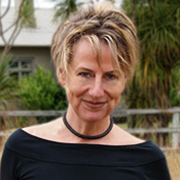
Roz Mason
Roz Mason grew up in the rural South Waikato. After Selwyn College and a Drama Diploma from Auckland University, she "talked her way into" a job at TVNZ in 1988. The NZ International Arts Festival was on. "Much of that was televised, so I got to observe directing in many forms, a great deal of which involved men in control rooms bellowing over comms, flanked by women – producer's assistants and vision mixers – who seemed to be quietly making things happen."
Mason’s early directing credits were short factual items for TVNZ staples like Kaleidoscope and Fair Go — plus Crimewatch, "where I learned about shooting drama". Mason established herself as a go-to director for arts programmes like The Edge, Backch@t, Work of Art and Mercury Lane. "I just learned on the job – often from my mistakes. There was no structured training, but field crews and editors were my teachers really."
Her first full-length directing gig was By the Light of the Mune. The documentary followed acting/directing veteran Ian Mune and Toi Whakaari students as they tried to devise and make a short film within a 48 hour time frame.
Mason’s next full-length credit was Survivors - Women Who Fought Back. Commissioned by newly-formed channel TV3 and presented by Pam Corkery, the documentary was an anthology of stories of women who had survived attack. Survivors "propelled" Mason out of the shelter of TVNZ, and into the freelance world.
Going freelance – "the best thing I could’ve done" – led to Mason working with a suite of leading Kiwi production companies (including Gibson Group and Greenstone). Mason’s subjects have ranged from composer Gareth Farr (Farr From Heaven) to soldier Charles Upham, from Chinese settlers to American sword swallowers.
Gigs for company NHNZ included local series (Our Big Blue Backyard) and international work: Orangutan Island, Panda Valley High, and episodes from long-running US series I Survived, where people recounted experiences of crime and disaster. "I love telling science stories and stories of human struggle."
Across a catholic credit list, Mason reflects on her luck at having been able to "play with form and content over many genres". Asked to single out a couple of highlights, she mentions episodes of Poets' Corner and Here to Stay. The Poets’ Corner series, produced by Third Party Pictures and Colin Hogg, united a director, poet and a film crew, and "sent them out to play". The result, says Mason, was something like a music video, but with poetry.
Here to Stay was a Gibson Group series where well-known New Zealanders explored the stories and history of a New Zealand settler group they had a connection to, deconstructing the Kiwi character en route. Like other series Mason had worked on (Epitaph, Taonga, Shipwreck), the director enjoyed the producers' pre-shoot investment in exploring the philosophy, style and method of what they were making. "Sounds self-evident doesn't it? But it’s astonishing how often this doesn't happen, and instead these matters are tackled in post, at the bottom of the cliff."
In 2006 Mason moved her family to the Wairarapa. There her company Silk Purse Productions has video editing facilities amidst native bush and an orchard, and she endeavours to provide her son with the same free-ranging childhood she had.
Mason's career came full circle in 2015 when she joined the directing team for TVNZ’s Country Calendar — where she files stories on all-things rural.
Profile updated on 3 February 2021
Sources include
Roz Mason